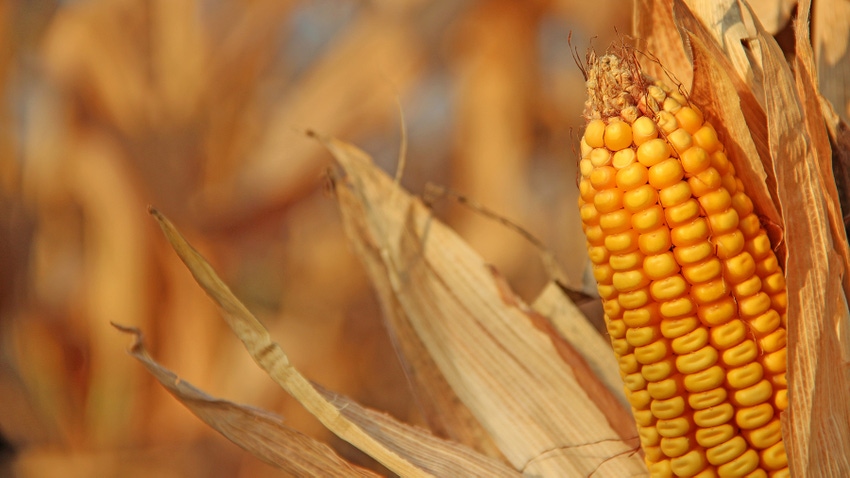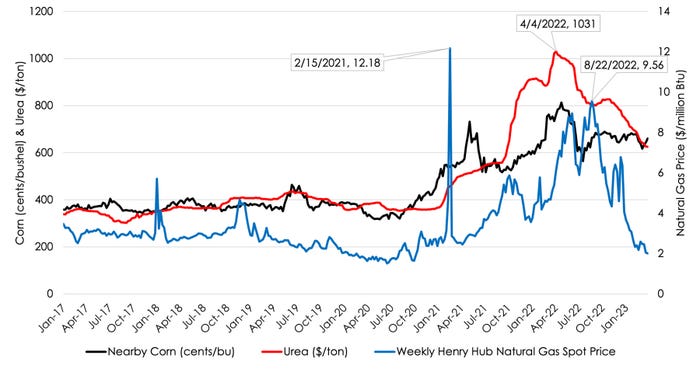May 10, 2023

By Aaron Smith and Chris Boyer, University of Tennessee Institute of Agriculture
Fertilizer prices have come down from the peak in April 2022, however fertilizer prices remain elevated compared to 2017 through 2020.
In 2021 and 2022, high fertilizer prices coincided with high corn prices, resulting in positive profit margins for many producers, especially those that were not affected by adverse weather. Since August 2022, Henry Hub Natural Gas Prices have declined sharply.

Weekly Urea, Natural Gas, and Nearby Corn Futures Price, January 2, 2017, to March 27, 2023.
Natural gas is a key input in the production of nitrogen fertilizer accounting for 70-90% of variable production costs.
Two important questions for many producers are how related are these prices and how does this relationship potentially impact profitability in 2023? To examine this, we look at the historical relationship between corn, urea, and natural gas prices.
Positive correlation
Nitrogen, natural gas, and corn prices are positively correlated (correlation describes the strength of an association between two variables, positive correlation indicates that prices move in the same direction, negative correlation indicates prices move in opposite directions; correlation coefficients have values between -1 and 1).
Examining weekly price data from January 2017 to March 2023, natural gas and urea prices were positively correlated (0.738), natural gas and corn prices were positively correlated (0.668), and urea and nearby corn futures prices were positively correlated (0.906).
All three variables are strongly positively correlated. However, there are event-based anomalies in the data that create temporary deviations in the relationship between prices. For example, natural gas prices briefly spiked in February 2021 during a winter storm that strained natural gas and electricity markets in Texas and Oklahoma (USEIA, 2022).
It is also important to note that correlation does not indicate causation. In other words, a higher natural gas or urea price does not necessarily cause higher corn prices, and vice versa.
Moving in same direction
However, the takeaway from this figure and correlations for natural gas, corn, and urea prices are they tend to move in the same direction.
Over the past year, natural gas and urea prices have decreased substantially from recent highs. Urea prices have fallen from $1,031/ton to $626/ton (down 39%) and natural gas prices have fallen $9.56 to $2.01 (down 79%).
Nearby corn prices have decreased from $8.13 ½ to $6.60 ½ (down 19%). Based on the realized decline in natural gas prices, the downward trend in urea prices, and the historical correlations above, further weakness in corn futures prices may occur in 2023.
There are many factors that will influence corn (and other commodity) prices, such as weather and geopolitical uncertainty, however decreased prices for natural gas and urea provides some indication that weaker corn prices may occur in the not-too-distant future.
From a profitability standpoint for the 2023 crop year, many producers locked in fertilizer prices last fall or early in 2023. In general, those that priced earlier will have higher fertilizer costs than those that priced later.
Producers that have locked in fertilizer prices for the 2023 crop may want to consider locking in futures prices for a portion of their crop to avoid a margin squeeze should corn prices decline.
Source: Southern Ag Today
You May Also Like




